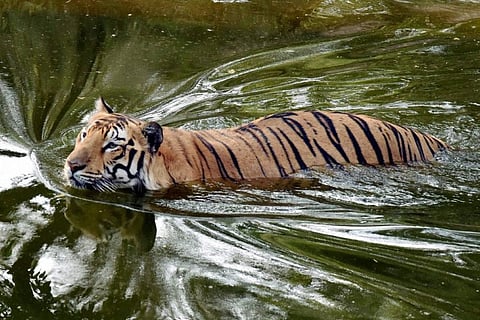

The first confirmed case of coronavirus in Hyderabad has prompted the city’s Nehru Zoological Park authorities to consider the screening of animals in its enclosures.
The veterinary team of the zoo held a meeting earlier this week and discussed the possibility of collecting samples from the animals and sending them to the Centre for Cellular and Molecular Biology (CCMB) in Hyderabad for tests.
"Amid the scare of coronavirus our team of veterinarians held a meeting and decided to take up the mounting task of collecting samples from animals and sending them to either CCMB in Hyderabad, Indian Institute of Science Education and Research, Bhauri or National Virology Institute, Pune. We are not sure which is the nodal agency who would test these samples. But we will take up the screening process," said zoo curator N Kshitija to TNM.
Taking additional precautions, zoo authorities are providing masks to the animal keepers and the 500-odd staff as well. "We have been supplying masks for the animal keepers for the past one month since the disease broke out in China. Now after a person was tested positive in Hyderabad we are providing masks to all the staff including the outsourced employees (security and drivers). "
The Hyderabad zoo is one of the most crowded places in the city, which sees 3,000-4,000 visitors during weekdays. Authorities are urging visitors to carry their own masks. Health Minister Eatala Rajender also advised citizens to abstain from visiting crowded places.
Coronaviruses are zoonotic, meaning they are transmitted between animals and people. Severe Acute Respiratory Syndrome CoV (SARS-CoV ) identified in 2003 was transmitted from civet cats to humans and MERS-CoV (Middle East respiratory syndrome-related coronavirus) identified in 2013 was transmitted from dromedary camels to humans, according to World Health Organization (WHO).
As far as SARS-CoV-2 (the name of the novel coronavirus) goes, scientists are yet to ascertain the route of transmission to humans. However, research suggests that there is a link between the novel coronavirus and bats, says the WHO. Experts believe that bats may have transmitted the virus to an intermediary host animal, which in turn has passed on the disease to humans. It is this intermediary host animal that experts are working to identify, states the WHO.
No evidence that pets can be source of coronavirus
Pet cats and dogs cannot pass the new coronavirus on to humans, but they can test positive for low levels of the pathogen if they catch it from their owners.
That's the conclusion of Hong Kong's Agriculture, Fisheries and Conservation Department after a dog in quarantine tested weak positive for the virus February 27, February 28 and March 2, using the canine's nasal and oral cavity samples.
An unidentified spokesman for the department was quoted in a news release as saying, "There is currently no evidence that pet animals can be a source of infection of COVID-19 (the name of the disease) or that they become sick."
Experts from the School of Public Health of The University of Hong Kong, the College of Veterinary Medicine and Life Sciences of the City University of Hong Kong and the World Organisation for Animal Health (OIE) have unanimously agreed that the dog has a low-level of infection and it is "likely to be a case of human-to-animal transmission".
The dog, and another also in quarantine which has tested negative for the virus, will be tested again before being released. The department suggested any pets, including dogs and cats, from households where someone has tested positive for the virus should be put into quarantine.
In general, pet owners should maintain good hygiene, including washing hands before and after handling animals, their food and supplies and no kissing them. People who are sick should avoid contact with pets and a veterinarian's advice should be sought if changes in a pet's health conditions are detected.
"Apart from maintaining good hygiene practices, pet owners need not be overly concerned and under no circumstances should they abandon their pets," the spokesman said.
With inputs from PTI